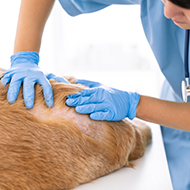Cortisol in shelter dog hair confirms high stress

The stress hormone cortisol accumulates in hair, in both humans and animals.
Dogs in shelters may experience chronic stress, a study from Utrecht University has discovered.
Researchers examined the amount of the stress hormone cortisol in the dogs' hair before, during and after their stay in the shelter, and found that on average, cortisol levels in the hair appeared to have increased by one-third after six weeks in the shelter.
After adoption, researchers measured the cortisol levels again at six weeks and six months, and found that cortisol levels were returning down to the levels found before entering the shelter.
The study found no difference in the cortisol levels of the dogs before entering the shelter, and the control group of domestic dogs.
Using the shave-reshave method, shaving the area on the same location of the body throughout the study, researchers allowed new hair to grow to measure the cortisol levels over a specific time period.
Janneke van der Laan, corresponding author of the study, explained: “We took daily measurements in the shelter for over a year.
“After adoption, the new owners - after clear instructions - cut the dogs hair and sent it to us. They were helpful and enthusiastic, and were very interested in what their dog had experienced before adoption.”
All dogs examined were in the same shelter, which has a reputation for improving dog welfare, using glass walls instead of bars to reduce noise pollution for the dogs.
Van der Laan said: “We know that a shelter is not a stress-free environment for dogs, even though staff members do their best to achieve the highest possible welfare.
“Even if you organise a shelter in the best possible way, there are still stress factors, such as crowds of other dogs and not being able to go outside as often as usual. And most important: the dog is gone from their old, familiar environment.
“The fact that we measured an increased amount of cortisol even in this shelter, suggests that this will also be the case in other shelters.”
Alongside finding the elevated cortisol levels in dogs' hair when they are in the shelter, the study also discovered that smaller dogs had higher cortisol levels than larger dogs. Van der Laan commented: “We have also seen this pattern in previous studies, for example in a study on the resting pattern of shelter dogs.
“We don't have a clear hypothesis about why that is, but it is interesting and is an area of focus for future research.”
Published in Scientific Reports, the results of the study are available to view here.



 The Veterinary Medicines Directorate (VMD) is inviting applications from veterinary students to attend a one-week extramural studies (EMS) placement in July 2026.
The Veterinary Medicines Directorate (VMD) is inviting applications from veterinary students to attend a one-week extramural studies (EMS) placement in July 2026.